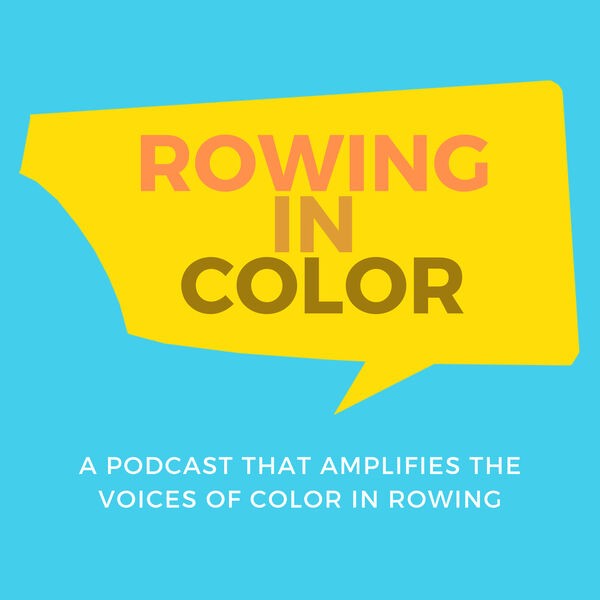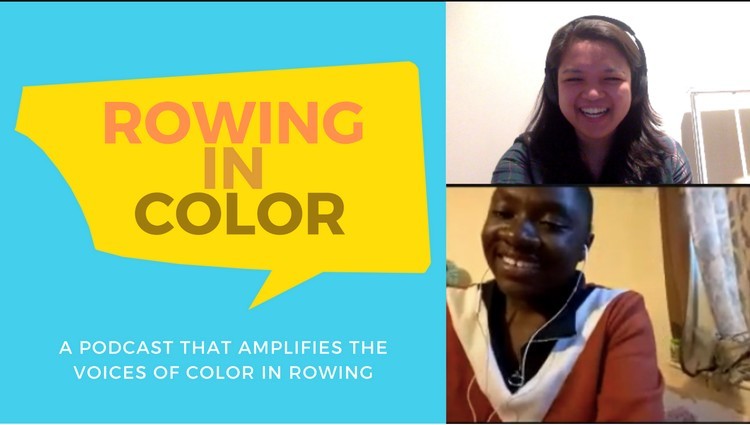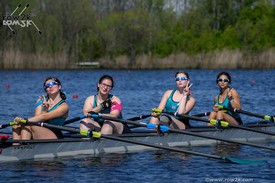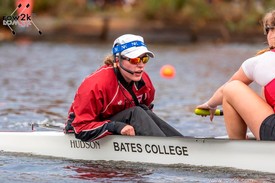
Rowing in Color is a new-ish podcast from Denise Aquino and Patricia Destine; since they started their podcast in early March, they have posted 14 interviews with rowing people of color, and have another two dozen interviews completed and in the pipeline.
row2k wrote to Rowing in Color after their first podcast posted in early March, but life and work became a little bit complicated in the interim to say the least, and we finally connected last week. In the course of a 65' discussion we touched on a lot of subjects, and following is Part 1 of a lightly edited transcript of the conversation.
Update: Rowing in Color has created a Checklist for Change, a free resource for people to take next steps forward; click to download the checklist.
row2k:A lot has happened since we were first in touch, especially in New York where you are. How are you doing? In real life, not with your involvement rowing.
Denise Aquino: Since you reached out months ago everyone had to change their lifestyles, and it's been hectic but thanks for making the time finally. I know in my neighborhood things are boarded up because of all the protests, and I'm not even near the protests. It's a whole new - it's not even normal - but it's just a whole new normal. There is a curfew, and you have to get your groceries with long sleeves and a mask and gloves, or get it delivered. Stay inside all day, work from home all day; you turn your bed into a desk. It's been a transition for sure but the podcast has been great to reach out to other people and connect.
Patricia Destine: The experience in Brooklyn has been interesting, because during the day it's very normal. Everyone's still living their normal lives, obviously with the mask and all the precautions that everyone's taking. But the last two nights or so, the protests came into Brooklyn, so we had a lot of protesting there. At one point the citizen app went off, and there was looting, so it's been interesting because it seems so normal, but then there's sporadic moments where you think, 'Wow, we have civil unrest and we have a pandemic happening all at once.'
row2k:It sounds like you are okay overall, which is good to hear. Looking back to the list of questions I wrote down in the first week of March, I wanted to ask how you met, how you got to know each other, and how you were inspired to put the podcast together. Since then, you have done fifteen podcasts, so you didn't tiptoe in it. You've been going hard.
Patricia: Yeah, we have a really weird meeting story. I was a student athlete at the time at Row New York, and Denise was there for an interview and she had to coach me on land as part of the interview. I was very aware that she was a woman of minority showing up to the boat house at the time, which is interesting for me to remember.
After that, she was in the boat house coaching middle school, I was on the team, and then, a couple years later, I started helping out with the middle school team. That bloomed into me then working with her as assistant coach. So we have been around each other a long time and got closer and closer, and then one day she said "Hey, I have this idea about a podcast." I asked what the idea was, and she said it was about giving people of color a voice." I was like, "Okay, I'm listening," and from there I said "I'm there. I'm supportive. I want to be part of it."
I'm a person of color who, at one point, walked away from rowing for a split second because I never felt like I fit in personally. I was personally ready to walk away when she said "This is an opportunity we should definitely jump on," and I said, "I'm there." I want to make sure that no one who looks like me, who comes from a similar background as me, feels like they don't fit into the sport, because the sport is not about race. It's not about college. It's not about your financial background. It's about who is the fastest boat when we get on that water.
I think that's our goal, just to keep making sure people's stories and voices are shared, and the sport becomes inclusive and diverse until no one's taking pictures of that one black kid on the team just to say "Look, we have diversity." No, you have 10 black kids, and you have Hispanic kids, and you have Asian kids, and you have all these diverse children and adults in the same team. It stops looking at color and just looks at the team itself.
row2k:Even at Row New York, it was hard to find how you fit in? How old were you?
Patricia: Definitely. I was in ninth grade, so what, 14? That first year, my novice team was me and a bunch of kids from the Dominican Republic, and maybe a handful of students who were white, from all throughout the city. When we got to regattas, we were very aware that we were that diverse team, we were very aware that we were the darker skinned team. Very clear. We had three female coaches who were all white and at first I think they were culture shocked by us. The Dominicans kids wanted to play really loud Dominican music, you know, like some Dembow. Our warmup was a dance. Other teams would go for a run, we would dance for our warmup before we went on a run.
After practice, we didn't have like peanut butter and jelly sandwiches. We went and got taco litos from the corner guy. We went to the deli.
It was a huge culture shock for our coaches I think; they came from upstate New York or Texas, and were trying to figure out "How do we stop looking at them as this different group and just look at them as rowers?" I think it took about six months into us joining the team for them to get accustomed to us, and I appreciate that they did do their best to be that support system. But they also didn't understand how we felt when we got to a regatta. When we got out of the vans and we got to our trailer, we noticed that everyone else was looking at us. We felt that and we would whisper it to each other.
There were just a lot of little things that we were very aware of, and our white teammates who were from New York, they were even culture shocked by us. I said, "You guys are from New York and you guys don't know what a taco lito is, and going to the deli is weird for you guys," or taking the train was weird for them. We're New Yorkers, New Yorkers take the train. That's what we're known for. The MTA is like, it's a race car for us. We do that for fun, you know, so it was a little weird. I was always aware that I was actually the only person who was black on my team. Everyone else, they identified with being Hispanic; I was a Haitian-American. So it was like culture shock every time I went to a regatta; "Oh, my God, I'm the black one. I’m the smaller one, I'm the black one." I didn't fit the mold of a rower.
I do remember this one instance where my coach said, "You need to stop worrying about them." It was a very, very blunt statement to all of us. "Stop looking at them, stop worrying about them. You're here to take their medals. You're here to take their spot and prove yourselves." And, in that moment, I think we all really did stop looking at them, and from that moment on, it was very clear that we just wanted to make sure we were that top boat always and we did our best every single race to do that.

row2k:You have done a heap of podcasts already; do you have any favorite or most inspiring moments so far, or maybe moments that were most surprising?
Patricia: For me, the most interesting episode for me was our first interviewee, Duane Adams. He shocked me because of his strength. This is a man who was shot when he was very young and lost his eyesight due to that, and that didn't stop him from going into rowing. This is someone who wasn't part of the rowing world prior to this, and then this accident helped him join the rowing world. For him get to compete internationally and create an organization that supports people who have disabilities (Breaking Barriers Rowing and Fitness), who might not be viewed as the perfect rower, I think that's amazing. And it gives me strength because I think, I can't complain about a 2K. I can't complain about a workout when here's someone who has other struggles in life and they're still showing up and they're still doing that work. There's not an excuse anymore because there's this bar, and if they can hit it, so can I.
Denise: When we started, we didn't have policies on who we would or wouldn't interview. We just wanted to reach out to people. The first time we reached out to someone who was under 18, we didn't find that out until we connected with them, and even though there's nothing against reaching out to someone who's under 18 as long as you get their parent's signature, we still felt very strongly that, we're both over 18, and although sometimes we might not look it (laughs), we understand these aren't easy questions. These aren't questions that you ask when you go out for coffee. These are deep questions and, even though we have no doubt that high schoolers and middle schoolers are having these conversations already, in our position and as adults, we didn't want to be in a position to make someone feel like they were forced to answer a question, even if they said that they were comfortable.
So one of the surprising moments was, when we were in touch with someone who is coming up in a future episode and we found out that they were under 18, she surprised us by just sharing her story. We didn't recorded it at all. She is still 16, and she casually mentioned that she started her own rowing club at the age of 14, and she's the only black girl in her rowing club, the only black girl in her boat. When she brought that up, we had a lot of follow up questions, but we also wanted to know how we could get her involved to interview other people who are under the age of 18 to share the stories that are already taking place for people who are in high school or middle school, and to do it in a way where we don't feel like we're taking advantage of them in a way, because we're older and because we're the interviewers; and that led to some creativity.

Denise: It's hard not to be changed from listening to all of these stories. So far, the episodes published are all black people, and we do want to reach out to all the people of color. But we were very specific and very intentional starting out reaching out to black people, mostly because we did intend to start during Black History Month - but still, we wanted to highlight black people because, out of all of the races and ethnicities in this country, and you see it on the news, it's not obvious that black lives matter. It's not clear that black lives matter. It's not common thought that black lives matter. So it was very intentional for us to start off with interviewing people who identified as black and/or African-American.
As a non-black person of color, it's hard for me to find the right words to articulate how I have changed as a result of that. I came into this process somewhat aware of my privileges as an Asian-American. Even though I have a Spanish last name, ethnically I'm Filipino American. I have experienced times and moments when people would just see my last name and assume that I'm Latina or Hispanic, and treat me differently because of that assumption, versus, "Oh, you're actually Asian." There really shouldn't be any difference unless I did something in the millisecond between, you know, someone thinking one thing and then something else other than the content of my character to influence that decision.
I thought I recognized my privileges coming into this passion project of ours and right now, we've recorded 30 episodes and published 13, hopefully 14 by the end of today, and after having recorded those sessions, it is a constant journey, at least for someone like me, a non-black person of color, to continue working on my privileges - not in a way to save anybody, not in a way to speak for anybody.
In our mission statement it says to amplify the voices of color; not to advocate for the voices of color, but to amplify the voices of color. Because for black people and other people of colo,r their voice alone should be enough, but there aren't enough avenues. There aren't enough things in place, channels of communication, ears that are willing to listen.
So as a non-black person of color, it has been humbling. Patricia is great at this not because she is black, but because of how she thinks, how she asks questions. If you want something done, not just in rowing, but also with moving the conversation forward, that's her, and it just so happens that she is black. I'm happy and grateful that she's here to interview and ask the tough questions that even I feel really uncomfortable asking as someone who has a different level of privilege this is not from what I did, but is just something I was born with.
So that's something that has changed for me. Our working relationship, which has gone from, you know, Patricia would determine if I would get a job at Row New York or not, has gone a long way, and I hope that the strength of our working relationship is reflected in the podcast
Patricia: I would hope that people get the really good vibes that we work together really well, because we do even off the podcast. But I think for me, the change is the way I view rowing. Like I said earlier, for a very long time, for me and rowing, I viewed it as it was kind of like a job. I love the kids I work with, I adore them, and I work with middle schoolers over high schoolers because of the simple fact that I needed to remember why I love this sport.
That's a crazy thing to say - why would you stay in a sport that you didn't know if you liked it anymore - but I wanted to work with middle schoolers because of the fact that it kept reminding me of that new car feeling, that freshness, and it reminded me of the joy that the sport has before it gets to the greedy, needy, competitive part, where we only care about who has the fastest 2K score, you know, who has the best technique.
But it got to the point where I was also noticing that the competition wasn't who had the fastest 2K, it was who had the fastest 2K and who looked better to some extent because of their skills, and some of the skills that people were able to acquire was because they could afford to go to a rowing camp in the summer, they were able to afford to go to coxswain clinics, they were given certain things in life that other people weren't given. I kept looking and checking the box and I'd say, 'Why am I not able to do this? Why is my teammates who look like me not able to do this?' And it was always came back to our families didn't have the connections to rowing that other people had, we didn't have the funds in rowing like other people had, and we just didn't fit the mold that other coach/schools would look at.
I have friends who got recruited from our team to go to a rowing college with all white kids, and to some extent, it felt as they were chosen because they were the kid of color and they needed that 1% to look diverse. I remember having friends come home from those colleges, even quitting that school to transfer to a school where there was more diversity in rowing, and told us, "Well, you know, you should never go there because I was racially discriminated everywhere. I couldn't go to the store outside of campus without someone calling me out because I was a person of color in these areas. I had to go with a teammate who was white so I wouldn't get judged. I had to have teammates buy me food at certain restaurants because I didn't fit this mold."
Rowing is supposed to be such an amazing, open-door sport and, still sometimes I feel like the teams themselves, they pick and choose certain students because it makes their team look a certain way. You look at a lot of rowing pictures, and it's always people who look very similar, dressed in very similar styles. Everyone has, you know, their boat shoes and their fancy sunglasses and that's great and all that, that's part of the sport. Even baseball players love like their gear but, at the end of the day, not everyone looked alike.
So when Denise gave me this opportunity to be part of this podcast with her, I thought maybe this will help me spread the message of diversity. Maybe this will help me like enjoy and see that the sport is not just one sided anymore.
And in the past week or so, and it's crazy to say because we've had this forecast for a while now, in this past week since all of this is being brought up in front of the world in social media, everyone has contacted us and said, "Oh, my God. Like, you guys are doing the job. You guys are doing the message."
And I'm thinking, "Rowing has been around for decades. We should have not been the ones doing the job now. I'm 23 years old. I've been part of this rowing world for seven years now. It should not have taken me or Denise to do the job. This should have been something that US rowing was doing a long time ago." There's so many voices already doing it, why is it that the message we're getting is, "My God, I never even knew you guys existed." There are people of color who felt alone for a very long time and who are recently sharing these stories of, "This is how my team looked like for so long and I just always assumed that, like I just had to suck it up and just get used to it."
For example, Mary Whipple is a big thing, but it is hard to relate to her because I'm thinking, "I don't look like you. I'm not your size. I'm not white. I don't have any of your background." I don't have the same background as her, so how do I become as successful? But there are amazing people of color coxswains out there and they have so much to share, not just in their technique of how to coxswain well, but how to deal with being racially discriminated at regattas. There are rowers who are not six feet tall, smaller rowers who are people of color, and they've been successful at rowing.
This is reminding me that there are people who look like me, and it's okay to feel insecure sometimes in this sport, in any sport, but you have to remember that you need to keep sharing your voice. A lot of times, when people are insecure or they don't feel comfortable, we shut down and we, as people of color, need to remember that they can't we can't shut down when we feel insecure because there is someone else who's feeling that way just as much and they may not have the tools to vocalize it. In that moment, when you feel that way, you need to stand up taller and you need to say something because someone. I can't walk into a room of white people and be the only person of color, and then shut down. I automatically become a ghost in the corner, you know? But, if I walk in there head held high and make myself known, I will be known, and it gives a chance for someone else who is a person of color who walks up behind me, they can be known. And people will go, "Okay, well, there are people of color here. Let's get to know more about this sport from their eyes."
So I think this is changing me because it's reminding me of why I'm doing this in the first place, but it's also reminding me that rowing is diverse. We just need to continue to put it out there. There are people who look like us on these teams. They just don't have a voice and they need that spotlight.
If you enjoy and rely on row2k, we need your help to be able to keep doing all this. Though row2k sometimes looks like a big, outside-funded operation, it mainly runs on enthusiasm and grit. Help us keep it coming, thank you! Learn more.
Comments | Log in to comment |
There are no Comments yet
| |
- Bont Rowing
- Calm Waters Rowing
- Concept 2
- Craftsbury Sculling
- The Crew Classic
- CrewLAB
- Croker
- Dad Vail Regatta
- Durham Boat Co.
- Empacher
- Faster Masters
- Filippi
- Fluidesign
- h2row.net
- HUDSON
- Live2Row Studios
- Nielsen-Kellerman
- Oak Ridge RA
- Peinert Boat Works
- Pocock Racing Shells
- Race1 USA
- Rockland Rowing Masters Regatta
- RowKraft
- Rubini Jewelers
- Vespoli USA
- WinTech Racing
- Bont Rowing
- Calm Waters Rowing
- Concept 2
- Craftsbury Sculling
- The Crew Classic
- CrewLAB
- Croker
- Dad Vail Regatta
- Durham Boat Co.
- Empacher
- Faster Masters
- Filippi
- Fluidesign
- h2row.net
- HUDSON
- Live2Row Studios
- Nielsen-Kellerman
- Oak Ridge RA
- Peinert Boat Works
- Pocock Racing Shells
- Race1 USA
- Rockland Rowing Masters Regatta
- RowKraft
- Rubini Jewelers
- Vespoli USA
- WinTech Racing

















